Detailed Analysis of the Business Environment: Iceland Supermarket
VerifiedAdded on 2019/12/03
|16
|5771
|151
Report
AI Summary
This report examines the business environment of Iceland Supermarket, a UK-based frozen food retailer. It begins by exploring the purposes of different organizational structures, including public and private entities, and assesses how Iceland Supermarket aligns with the objectives of its various stakeholders, such as customers, suppliers, and employees. The report then delves into the economic systems that influence the allocation of resources, focusing on the impacts of fiscal and monetary policies, as well as competition and regulatory mechanisms. Furthermore, it analyzes how market structures affect pricing and output decisions, and how market forces shape Iceland Supermarket's responses. The report also considers the influence of the business and cultural environments on the company's behavior. Finally, it addresses the significance of international trade, the impact of global factors on the organization, and the effects of European Union policies on Iceland Supermarket's operations, providing a comprehensive overview of the external and internal factors affecting the company.
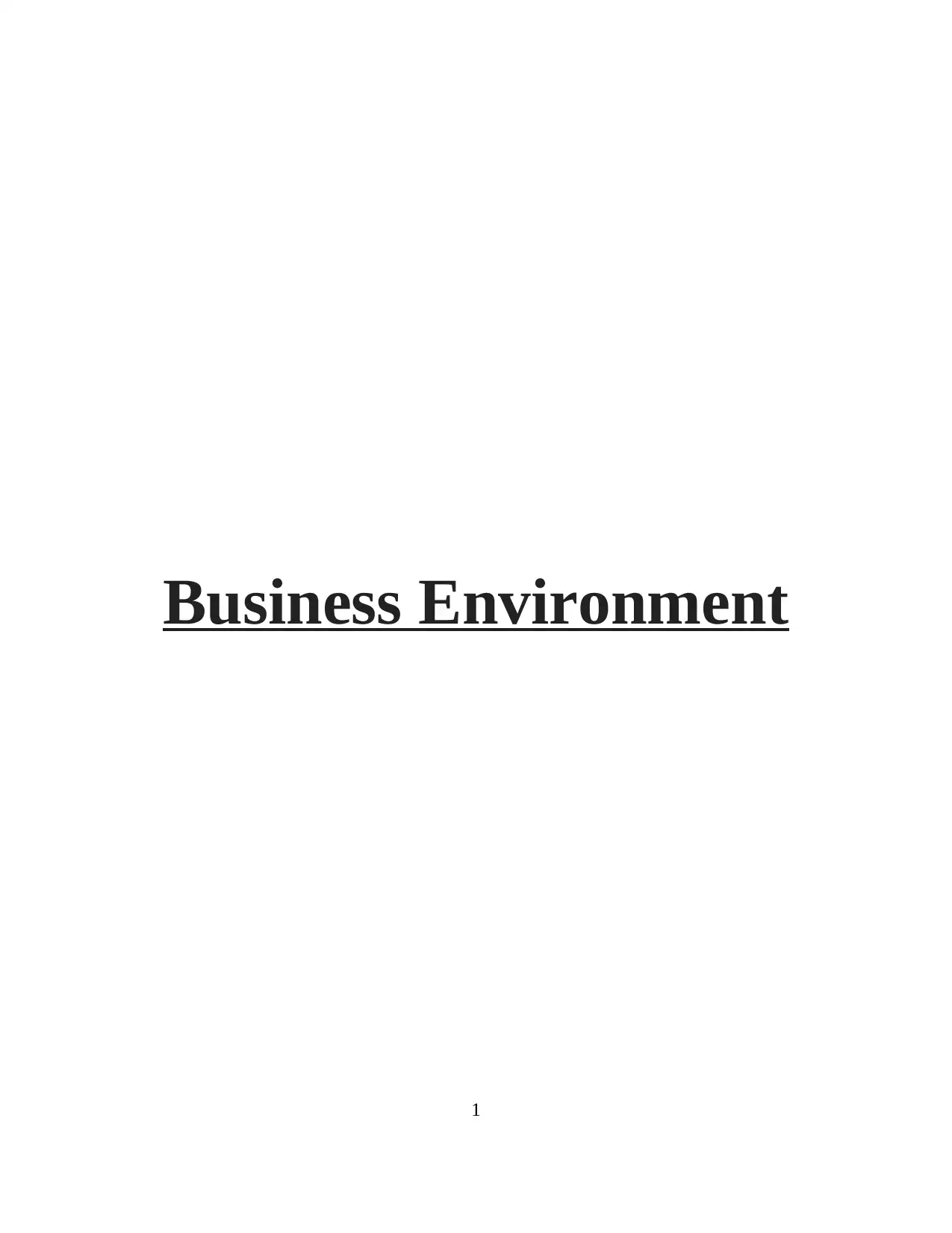
Business Environment
1
1
Paraphrase This Document
Need a fresh take? Get an instant paraphrase of this document with our AI Paraphraser
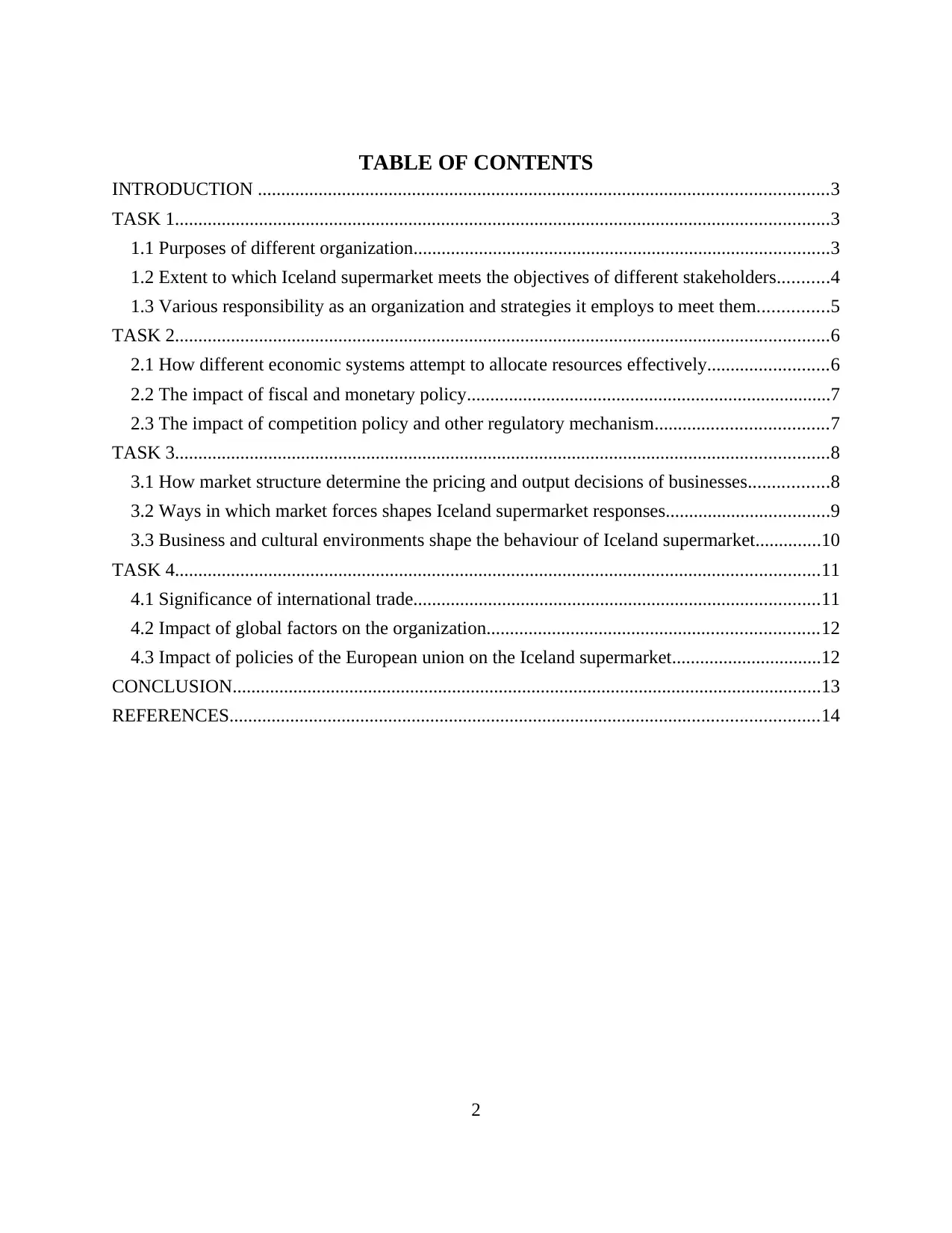
TABLE OF CONTENTS
INTRODUCTION ..........................................................................................................................3
TASK 1............................................................................................................................................3
1.1 Purposes of different organization.........................................................................................3
1.2 Extent to which Iceland supermarket meets the objectives of different stakeholders...........4
1.3 Various responsibility as an organization and strategies it employs to meet them...............5
TASK 2............................................................................................................................................6
2.1 How different economic systems attempt to allocate resources effectively..........................6
2.2 The impact of fiscal and monetary policy..............................................................................7
2.3 The impact of competition policy and other regulatory mechanism.....................................7
TASK 3............................................................................................................................................8
3.1 How market structure determine the pricing and output decisions of businesses.................8
3.2 Ways in which market forces shapes Iceland supermarket responses...................................9
3.3 Business and cultural environments shape the behaviour of Iceland supermarket..............10
TASK 4..........................................................................................................................................11
4.1 Significance of international trade.......................................................................................11
4.2 Impact of global factors on the organization.......................................................................12
4.3 Impact of policies of the European union on the Iceland supermarket................................12
CONCLUSION..............................................................................................................................13
REFERENCES..............................................................................................................................14
2
INTRODUCTION ..........................................................................................................................3
TASK 1............................................................................................................................................3
1.1 Purposes of different organization.........................................................................................3
1.2 Extent to which Iceland supermarket meets the objectives of different stakeholders...........4
1.3 Various responsibility as an organization and strategies it employs to meet them...............5
TASK 2............................................................................................................................................6
2.1 How different economic systems attempt to allocate resources effectively..........................6
2.2 The impact of fiscal and monetary policy..............................................................................7
2.3 The impact of competition policy and other regulatory mechanism.....................................7
TASK 3............................................................................................................................................8
3.1 How market structure determine the pricing and output decisions of businesses.................8
3.2 Ways in which market forces shapes Iceland supermarket responses...................................9
3.3 Business and cultural environments shape the behaviour of Iceland supermarket..............10
TASK 4..........................................................................................................................................11
4.1 Significance of international trade.......................................................................................11
4.2 Impact of global factors on the organization.......................................................................12
4.3 Impact of policies of the European union on the Iceland supermarket................................12
CONCLUSION..............................................................................................................................13
REFERENCES..............................................................................................................................14
2
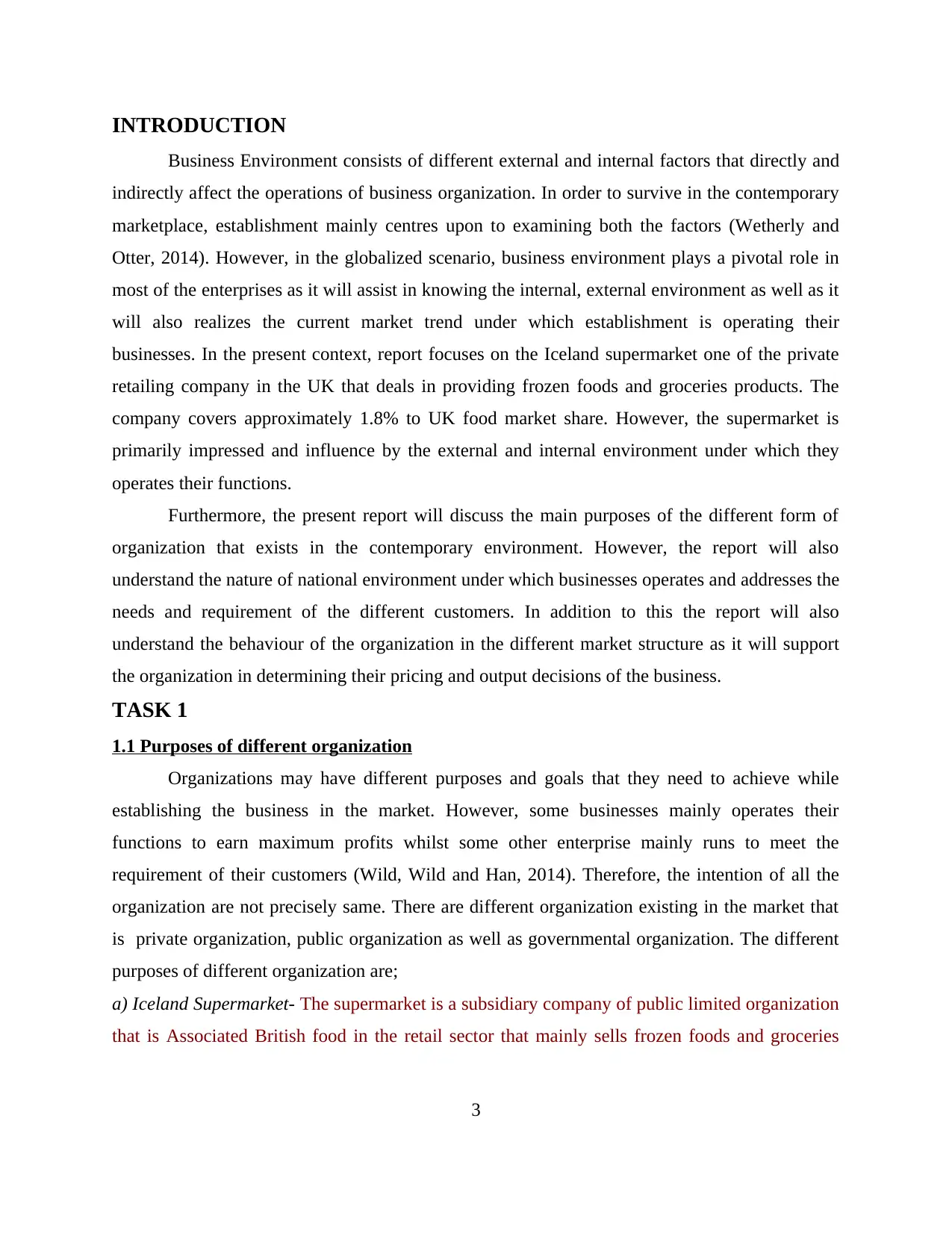
INTRODUCTION
Business Environment consists of different external and internal factors that directly and
indirectly affect the operations of business organization. In order to survive in the contemporary
marketplace, establishment mainly centres upon to examining both the factors (Wetherly and
Otter, 2014). However, in the globalized scenario, business environment plays a pivotal role in
most of the enterprises as it will assist in knowing the internal, external environment as well as it
will also realizes the current market trend under which establishment is operating their
businesses. In the present context, report focuses on the Iceland supermarket one of the private
retailing company in the UK that deals in providing frozen foods and groceries products. The
company covers approximately 1.8% to UK food market share. However, the supermarket is
primarily impressed and influence by the external and internal environment under which they
operates their functions.
Furthermore, the present report will discuss the main purposes of the different form of
organization that exists in the contemporary environment. However, the report will also
understand the nature of national environment under which businesses operates and addresses the
needs and requirement of the different customers. In addition to this the report will also
understand the behaviour of the organization in the different market structure as it will support
the organization in determining their pricing and output decisions of the business.
TASK 1
1.1 Purposes of different organization
Organizations may have different purposes and goals that they need to achieve while
establishing the business in the market. However, some businesses mainly operates their
functions to earn maximum profits whilst some other enterprise mainly runs to meet the
requirement of their customers (Wild, Wild and Han, 2014). Therefore, the intention of all the
organization are not precisely same. There are different organization existing in the market that
is private organization, public organization as well as governmental organization. The different
purposes of different organization are;
a) Iceland Supermarket- The supermarket is a subsidiary company of public limited organization
that is Associated British food in the retail sector that mainly sells frozen foods and groceries
3
Business Environment consists of different external and internal factors that directly and
indirectly affect the operations of business organization. In order to survive in the contemporary
marketplace, establishment mainly centres upon to examining both the factors (Wetherly and
Otter, 2014). However, in the globalized scenario, business environment plays a pivotal role in
most of the enterprises as it will assist in knowing the internal, external environment as well as it
will also realizes the current market trend under which establishment is operating their
businesses. In the present context, report focuses on the Iceland supermarket one of the private
retailing company in the UK that deals in providing frozen foods and groceries products. The
company covers approximately 1.8% to UK food market share. However, the supermarket is
primarily impressed and influence by the external and internal environment under which they
operates their functions.
Furthermore, the present report will discuss the main purposes of the different form of
organization that exists in the contemporary environment. However, the report will also
understand the nature of national environment under which businesses operates and addresses the
needs and requirement of the different customers. In addition to this the report will also
understand the behaviour of the organization in the different market structure as it will support
the organization in determining their pricing and output decisions of the business.
TASK 1
1.1 Purposes of different organization
Organizations may have different purposes and goals that they need to achieve while
establishing the business in the market. However, some businesses mainly operates their
functions to earn maximum profits whilst some other enterprise mainly runs to meet the
requirement of their customers (Wild, Wild and Han, 2014). Therefore, the intention of all the
organization are not precisely same. There are different organization existing in the market that
is private organization, public organization as well as governmental organization. The different
purposes of different organization are;
a) Iceland Supermarket- The supermarket is a subsidiary company of public limited organization
that is Associated British food in the retail sector that mainly sells frozen foods and groceries
3
⊘ This is a preview!⊘
Do you want full access?
Subscribe today to unlock all pages.

Trusted by 1+ million students worldwide
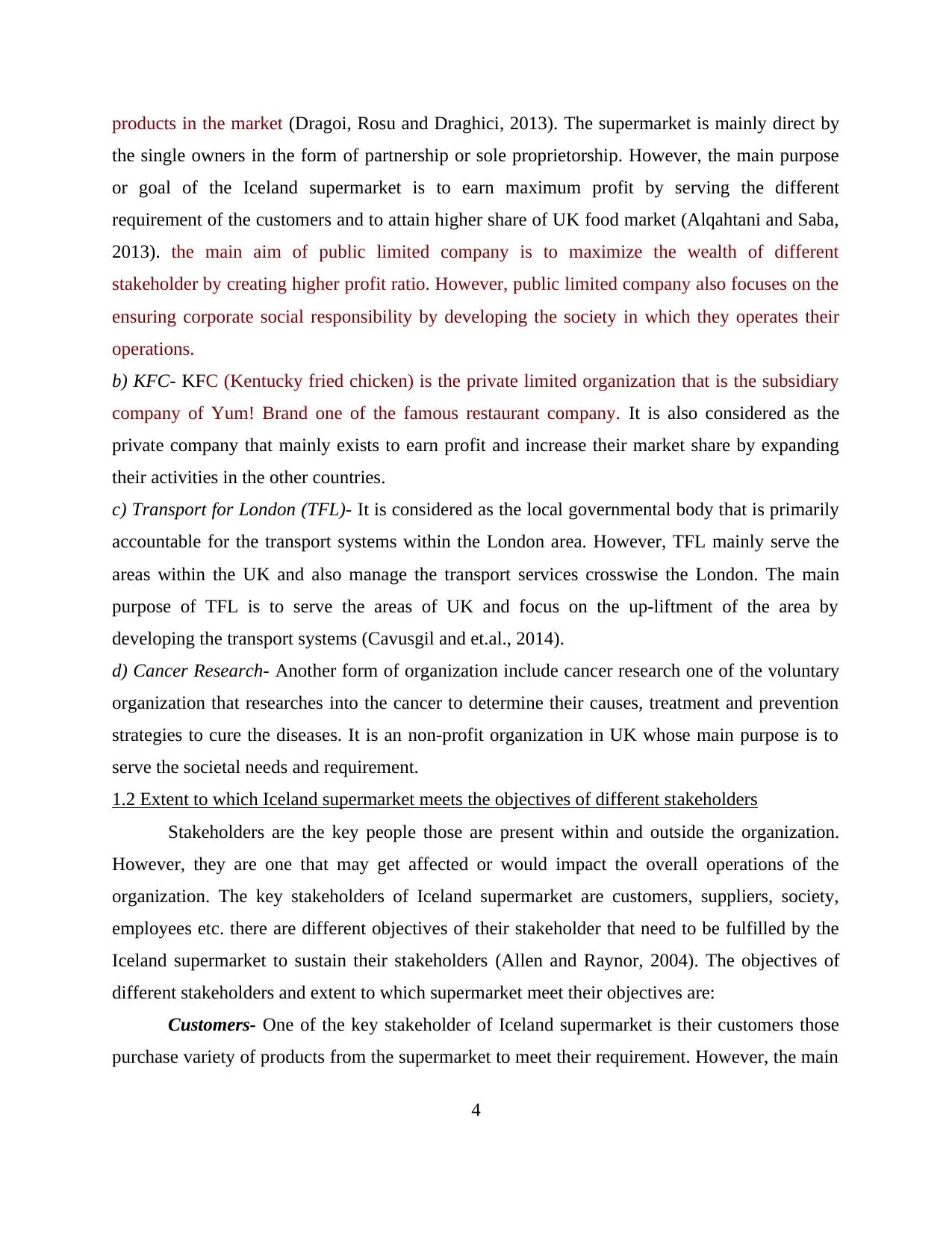
products in the market (Dragoi, Rosu and Draghici, 2013). The supermarket is mainly direct by
the single owners in the form of partnership or sole proprietorship. However, the main purpose
or goal of the Iceland supermarket is to earn maximum profit by serving the different
requirement of the customers and to attain higher share of UK food market (Alqahtani and Saba,
2013). the main aim of public limited company is to maximize the wealth of different
stakeholder by creating higher profit ratio. However, public limited company also focuses on the
ensuring corporate social responsibility by developing the society in which they operates their
operations.
b) KFC- KFC (Kentucky fried chicken) is the private limited organization that is the subsidiary
company of Yum! Brand one of the famous restaurant company. It is also considered as the
private company that mainly exists to earn profit and increase their market share by expanding
their activities in the other countries.
c) Transport for London (TFL)- It is considered as the local governmental body that is primarily
accountable for the transport systems within the London area. However, TFL mainly serve the
areas within the UK and also manage the transport services crosswise the London. The main
purpose of TFL is to serve the areas of UK and focus on the up-liftment of the area by
developing the transport systems (Cavusgil and et.al., 2014).
d) Cancer Research- Another form of organization include cancer research one of the voluntary
organization that researches into the cancer to determine their causes, treatment and prevention
strategies to cure the diseases. It is an non-profit organization in UK whose main purpose is to
serve the societal needs and requirement.
1.2 Extent to which Iceland supermarket meets the objectives of different stakeholders
Stakeholders are the key people those are present within and outside the organization.
However, they are one that may get affected or would impact the overall operations of the
organization. The key stakeholders of Iceland supermarket are customers, suppliers, society,
employees etc. there are different objectives of their stakeholder that need to be fulfilled by the
Iceland supermarket to sustain their stakeholders (Allen and Raynor, 2004). The objectives of
different stakeholders and extent to which supermarket meet their objectives are:
Customers- One of the key stakeholder of Iceland supermarket is their customers those
purchase variety of products from the supermarket to meet their requirement. However, the main
4
the single owners in the form of partnership or sole proprietorship. However, the main purpose
or goal of the Iceland supermarket is to earn maximum profit by serving the different
requirement of the customers and to attain higher share of UK food market (Alqahtani and Saba,
2013). the main aim of public limited company is to maximize the wealth of different
stakeholder by creating higher profit ratio. However, public limited company also focuses on the
ensuring corporate social responsibility by developing the society in which they operates their
operations.
b) KFC- KFC (Kentucky fried chicken) is the private limited organization that is the subsidiary
company of Yum! Brand one of the famous restaurant company. It is also considered as the
private company that mainly exists to earn profit and increase their market share by expanding
their activities in the other countries.
c) Transport for London (TFL)- It is considered as the local governmental body that is primarily
accountable for the transport systems within the London area. However, TFL mainly serve the
areas within the UK and also manage the transport services crosswise the London. The main
purpose of TFL is to serve the areas of UK and focus on the up-liftment of the area by
developing the transport systems (Cavusgil and et.al., 2014).
d) Cancer Research- Another form of organization include cancer research one of the voluntary
organization that researches into the cancer to determine their causes, treatment and prevention
strategies to cure the diseases. It is an non-profit organization in UK whose main purpose is to
serve the societal needs and requirement.
1.2 Extent to which Iceland supermarket meets the objectives of different stakeholders
Stakeholders are the key people those are present within and outside the organization.
However, they are one that may get affected or would impact the overall operations of the
organization. The key stakeholders of Iceland supermarket are customers, suppliers, society,
employees etc. there are different objectives of their stakeholder that need to be fulfilled by the
Iceland supermarket to sustain their stakeholders (Allen and Raynor, 2004). The objectives of
different stakeholders and extent to which supermarket meet their objectives are:
Customers- One of the key stakeholder of Iceland supermarket is their customers those
purchase variety of products from the supermarket to meet their requirement. However, the main
4
Paraphrase This Document
Need a fresh take? Get an instant paraphrase of this document with our AI Paraphraser
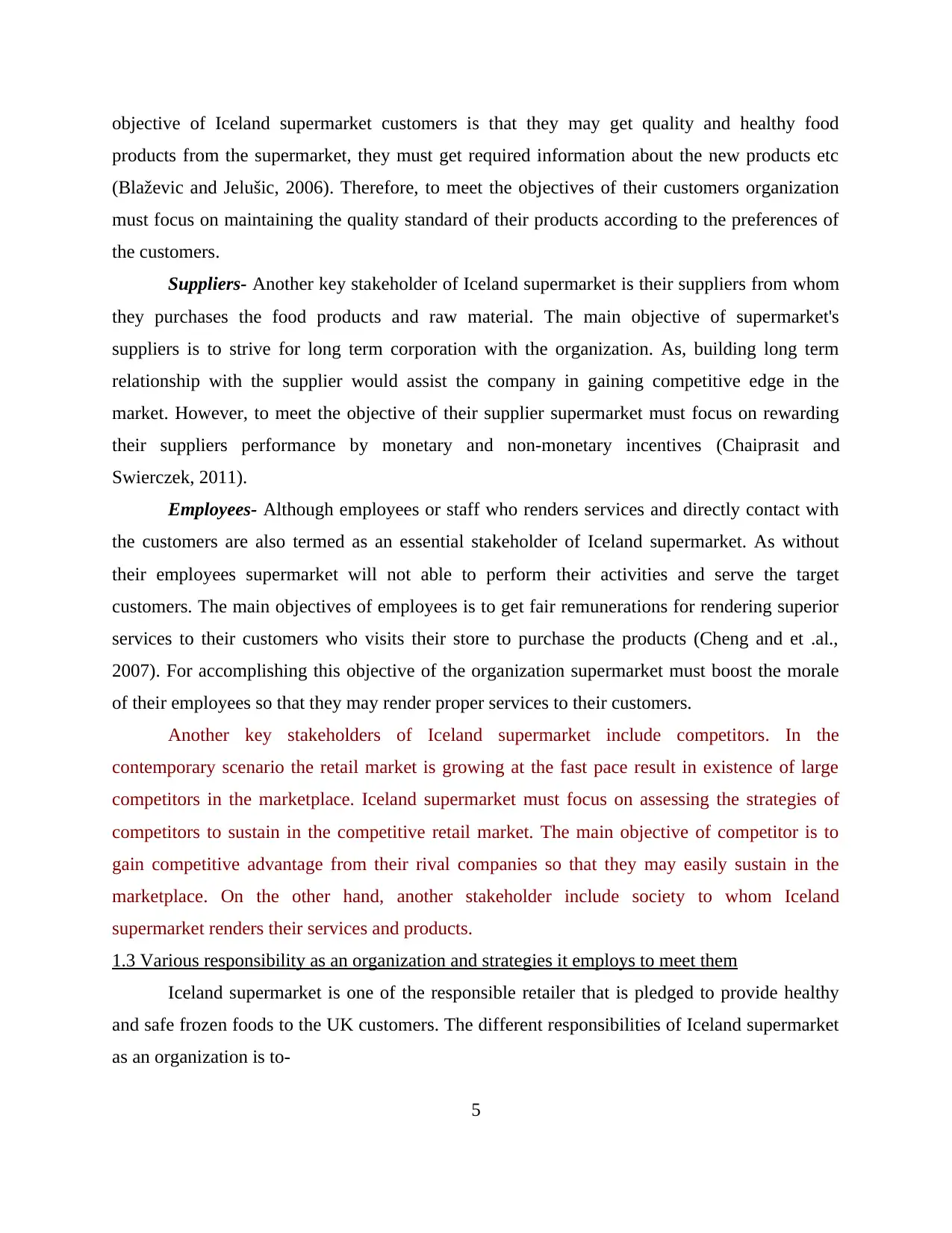
objective of Iceland supermarket customers is that they may get quality and healthy food
products from the supermarket, they must get required information about the new products etc
(Blaževic and Jelušic, 2006). Therefore, to meet the objectives of their customers organization
must focus on maintaining the quality standard of their products according to the preferences of
the customers.
Suppliers- Another key stakeholder of Iceland supermarket is their suppliers from whom
they purchases the food products and raw material. The main objective of supermarket's
suppliers is to strive for long term corporation with the organization. As, building long term
relationship with the supplier would assist the company in gaining competitive edge in the
market. However, to meet the objective of their supplier supermarket must focus on rewarding
their suppliers performance by monetary and non-monetary incentives (Chaiprasit and
Swierczek, 2011).
Employees- Although employees or staff who renders services and directly contact with
the customers are also termed as an essential stakeholder of Iceland supermarket. As without
their employees supermarket will not able to perform their activities and serve the target
customers. The main objectives of employees is to get fair remunerations for rendering superior
services to their customers who visits their store to purchase the products (Cheng and et .al.,
2007). For accomplishing this objective of the organization supermarket must boost the morale
of their employees so that they may render proper services to their customers.
Another key stakeholders of Iceland supermarket include competitors. In the
contemporary scenario the retail market is growing at the fast pace result in existence of large
competitors in the marketplace. Iceland supermarket must focus on assessing the strategies of
competitors to sustain in the competitive retail market. The main objective of competitor is to
gain competitive advantage from their rival companies so that they may easily sustain in the
marketplace. On the other hand, another stakeholder include society to whom Iceland
supermarket renders their services and products.
1.3 Various responsibility as an organization and strategies it employs to meet them
Iceland supermarket is one of the responsible retailer that is pledged to provide healthy
and safe frozen foods to the UK customers. The different responsibilities of Iceland supermarket
as an organization is to-
5
products from the supermarket, they must get required information about the new products etc
(Blaževic and Jelušic, 2006). Therefore, to meet the objectives of their customers organization
must focus on maintaining the quality standard of their products according to the preferences of
the customers.
Suppliers- Another key stakeholder of Iceland supermarket is their suppliers from whom
they purchases the food products and raw material. The main objective of supermarket's
suppliers is to strive for long term corporation with the organization. As, building long term
relationship with the supplier would assist the company in gaining competitive edge in the
market. However, to meet the objective of their supplier supermarket must focus on rewarding
their suppliers performance by monetary and non-monetary incentives (Chaiprasit and
Swierczek, 2011).
Employees- Although employees or staff who renders services and directly contact with
the customers are also termed as an essential stakeholder of Iceland supermarket. As without
their employees supermarket will not able to perform their activities and serve the target
customers. The main objectives of employees is to get fair remunerations for rendering superior
services to their customers who visits their store to purchase the products (Cheng and et .al.,
2007). For accomplishing this objective of the organization supermarket must boost the morale
of their employees so that they may render proper services to their customers.
Another key stakeholders of Iceland supermarket include competitors. In the
contemporary scenario the retail market is growing at the fast pace result in existence of large
competitors in the marketplace. Iceland supermarket must focus on assessing the strategies of
competitors to sustain in the competitive retail market. The main objective of competitor is to
gain competitive advantage from their rival companies so that they may easily sustain in the
marketplace. On the other hand, another stakeholder include society to whom Iceland
supermarket renders their services and products.
1.3 Various responsibility as an organization and strategies it employs to meet them
Iceland supermarket is one of the responsible retailer that is pledged to provide healthy
and safe frozen foods to the UK customers. The different responsibilities of Iceland supermarket
as an organization is to-
5
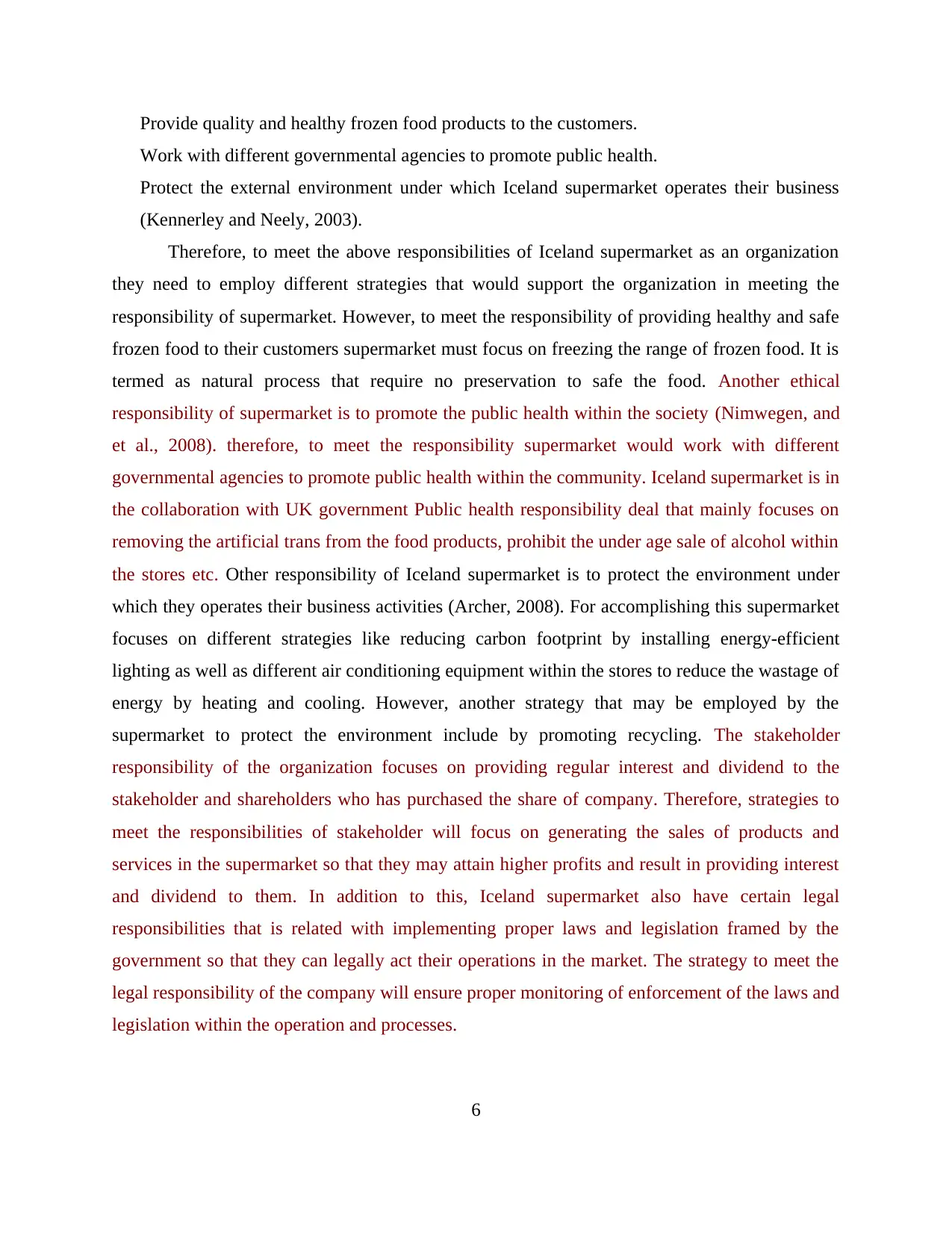
Provide quality and healthy frozen food products to the customers.
Work with different governmental agencies to promote public health.
Protect the external environment under which Iceland supermarket operates their business
(Kennerley and Neely, 2003).
Therefore, to meet the above responsibilities of Iceland supermarket as an organization
they need to employ different strategies that would support the organization in meeting the
responsibility of supermarket. However, to meet the responsibility of providing healthy and safe
frozen food to their customers supermarket must focus on freezing the range of frozen food. It is
termed as natural process that require no preservation to safe the food. Another ethical
responsibility of supermarket is to promote the public health within the society (Nimwegen, and
et al., 2008). therefore, to meet the responsibility supermarket would work with different
governmental agencies to promote public health within the community. Iceland supermarket is in
the collaboration with UK government Public health responsibility deal that mainly focuses on
removing the artificial trans from the food products, prohibit the under age sale of alcohol within
the stores etc. Other responsibility of Iceland supermarket is to protect the environment under
which they operates their business activities (Archer, 2008). For accomplishing this supermarket
focuses on different strategies like reducing carbon footprint by installing energy-efficient
lighting as well as different air conditioning equipment within the stores to reduce the wastage of
energy by heating and cooling. However, another strategy that may be employed by the
supermarket to protect the environment include by promoting recycling. The stakeholder
responsibility of the organization focuses on providing regular interest and dividend to the
stakeholder and shareholders who has purchased the share of company. Therefore, strategies to
meet the responsibilities of stakeholder will focus on generating the sales of products and
services in the supermarket so that they may attain higher profits and result in providing interest
and dividend to them. In addition to this, Iceland supermarket also have certain legal
responsibilities that is related with implementing proper laws and legislation framed by the
government so that they can legally act their operations in the market. The strategy to meet the
legal responsibility of the company will ensure proper monitoring of enforcement of the laws and
legislation within the operation and processes.
6
Work with different governmental agencies to promote public health.
Protect the external environment under which Iceland supermarket operates their business
(Kennerley and Neely, 2003).
Therefore, to meet the above responsibilities of Iceland supermarket as an organization
they need to employ different strategies that would support the organization in meeting the
responsibility of supermarket. However, to meet the responsibility of providing healthy and safe
frozen food to their customers supermarket must focus on freezing the range of frozen food. It is
termed as natural process that require no preservation to safe the food. Another ethical
responsibility of supermarket is to promote the public health within the society (Nimwegen, and
et al., 2008). therefore, to meet the responsibility supermarket would work with different
governmental agencies to promote public health within the community. Iceland supermarket is in
the collaboration with UK government Public health responsibility deal that mainly focuses on
removing the artificial trans from the food products, prohibit the under age sale of alcohol within
the stores etc. Other responsibility of Iceland supermarket is to protect the environment under
which they operates their business activities (Archer, 2008). For accomplishing this supermarket
focuses on different strategies like reducing carbon footprint by installing energy-efficient
lighting as well as different air conditioning equipment within the stores to reduce the wastage of
energy by heating and cooling. However, another strategy that may be employed by the
supermarket to protect the environment include by promoting recycling. The stakeholder
responsibility of the organization focuses on providing regular interest and dividend to the
stakeholder and shareholders who has purchased the share of company. Therefore, strategies to
meet the responsibilities of stakeholder will focus on generating the sales of products and
services in the supermarket so that they may attain higher profits and result in providing interest
and dividend to them. In addition to this, Iceland supermarket also have certain legal
responsibilities that is related with implementing proper laws and legislation framed by the
government so that they can legally act their operations in the market. The strategy to meet the
legal responsibility of the company will ensure proper monitoring of enforcement of the laws and
legislation within the operation and processes.
6
⊘ This is a preview!⊘
Do you want full access?
Subscribe today to unlock all pages.

Trusted by 1+ million students worldwide
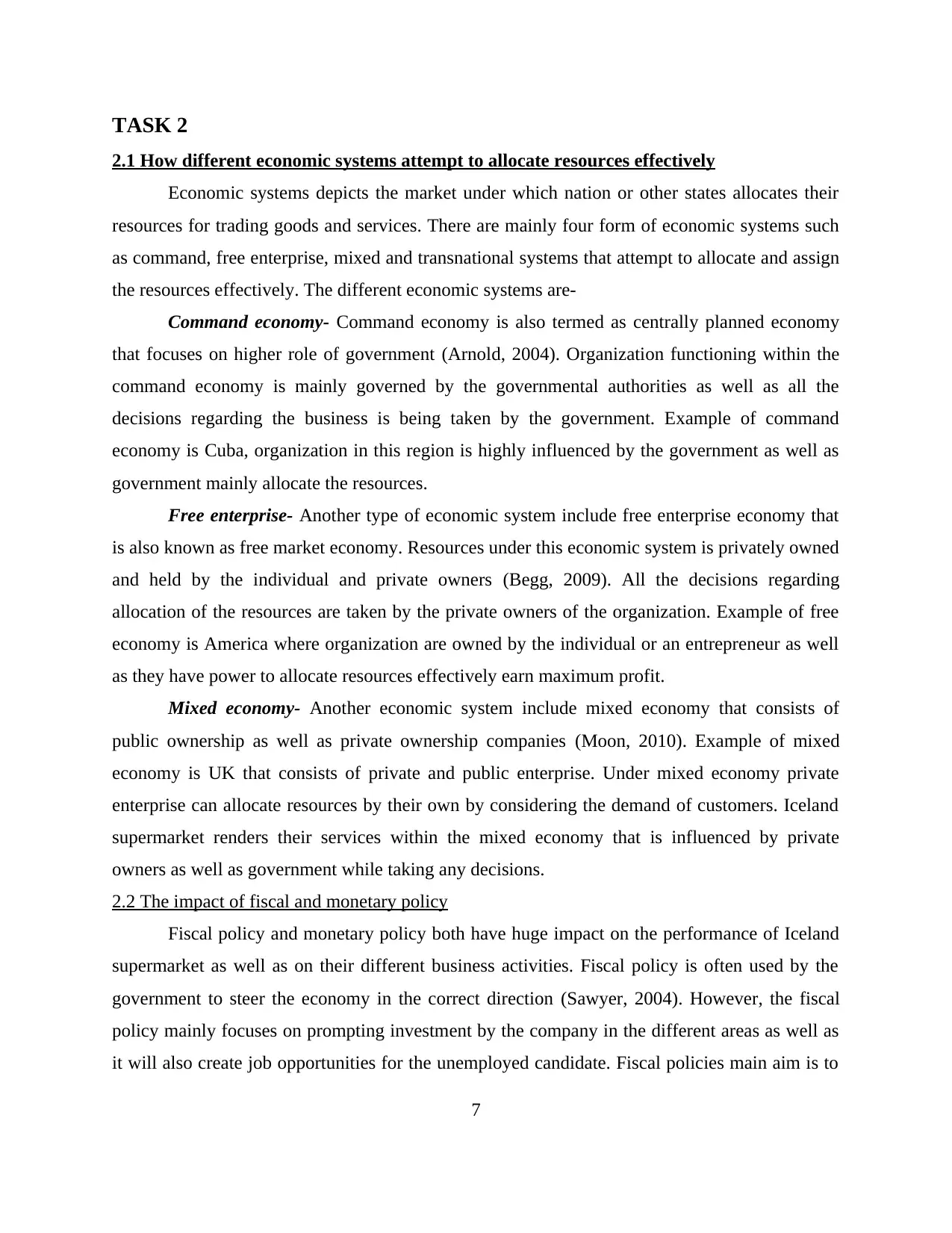
TASK 2
2.1 How different economic systems attempt to allocate resources effectively
Economic systems depicts the market under which nation or other states allocates their
resources for trading goods and services. There are mainly four form of economic systems such
as command, free enterprise, mixed and transnational systems that attempt to allocate and assign
the resources effectively. The different economic systems are-
Command economy- Command economy is also termed as centrally planned economy
that focuses on higher role of government (Arnold, 2004). Organization functioning within the
command economy is mainly governed by the governmental authorities as well as all the
decisions regarding the business is being taken by the government. Example of command
economy is Cuba, organization in this region is highly influenced by the government as well as
government mainly allocate the resources.
Free enterprise- Another type of economic system include free enterprise economy that
is also known as free market economy. Resources under this economic system is privately owned
and held by the individual and private owners (Begg, 2009). All the decisions regarding
allocation of the resources are taken by the private owners of the organization. Example of free
economy is America where organization are owned by the individual or an entrepreneur as well
as they have power to allocate resources effectively earn maximum profit.
Mixed economy- Another economic system include mixed economy that consists of
public ownership as well as private ownership companies (Moon, 2010). Example of mixed
economy is UK that consists of private and public enterprise. Under mixed economy private
enterprise can allocate resources by their own by considering the demand of customers. Iceland
supermarket renders their services within the mixed economy that is influenced by private
owners as well as government while taking any decisions.
2.2 The impact of fiscal and monetary policy
Fiscal policy and monetary policy both have huge impact on the performance of Iceland
supermarket as well as on their different business activities. Fiscal policy is often used by the
government to steer the economy in the correct direction (Sawyer, 2004). However, the fiscal
policy mainly focuses on prompting investment by the company in the different areas as well as
it will also create job opportunities for the unemployed candidate. Fiscal policies main aim is to
7
2.1 How different economic systems attempt to allocate resources effectively
Economic systems depicts the market under which nation or other states allocates their
resources for trading goods and services. There are mainly four form of economic systems such
as command, free enterprise, mixed and transnational systems that attempt to allocate and assign
the resources effectively. The different economic systems are-
Command economy- Command economy is also termed as centrally planned economy
that focuses on higher role of government (Arnold, 2004). Organization functioning within the
command economy is mainly governed by the governmental authorities as well as all the
decisions regarding the business is being taken by the government. Example of command
economy is Cuba, organization in this region is highly influenced by the government as well as
government mainly allocate the resources.
Free enterprise- Another type of economic system include free enterprise economy that
is also known as free market economy. Resources under this economic system is privately owned
and held by the individual and private owners (Begg, 2009). All the decisions regarding
allocation of the resources are taken by the private owners of the organization. Example of free
economy is America where organization are owned by the individual or an entrepreneur as well
as they have power to allocate resources effectively earn maximum profit.
Mixed economy- Another economic system include mixed economy that consists of
public ownership as well as private ownership companies (Moon, 2010). Example of mixed
economy is UK that consists of private and public enterprise. Under mixed economy private
enterprise can allocate resources by their own by considering the demand of customers. Iceland
supermarket renders their services within the mixed economy that is influenced by private
owners as well as government while taking any decisions.
2.2 The impact of fiscal and monetary policy
Fiscal policy and monetary policy both have huge impact on the performance of Iceland
supermarket as well as on their different business activities. Fiscal policy is often used by the
government to steer the economy in the correct direction (Sawyer, 2004). However, the fiscal
policy mainly focuses on prompting investment by the company in the different areas as well as
it will also create job opportunities for the unemployed candidate. Fiscal policies main aim is to
7
Paraphrase This Document
Need a fresh take? Get an instant paraphrase of this document with our AI Paraphraser
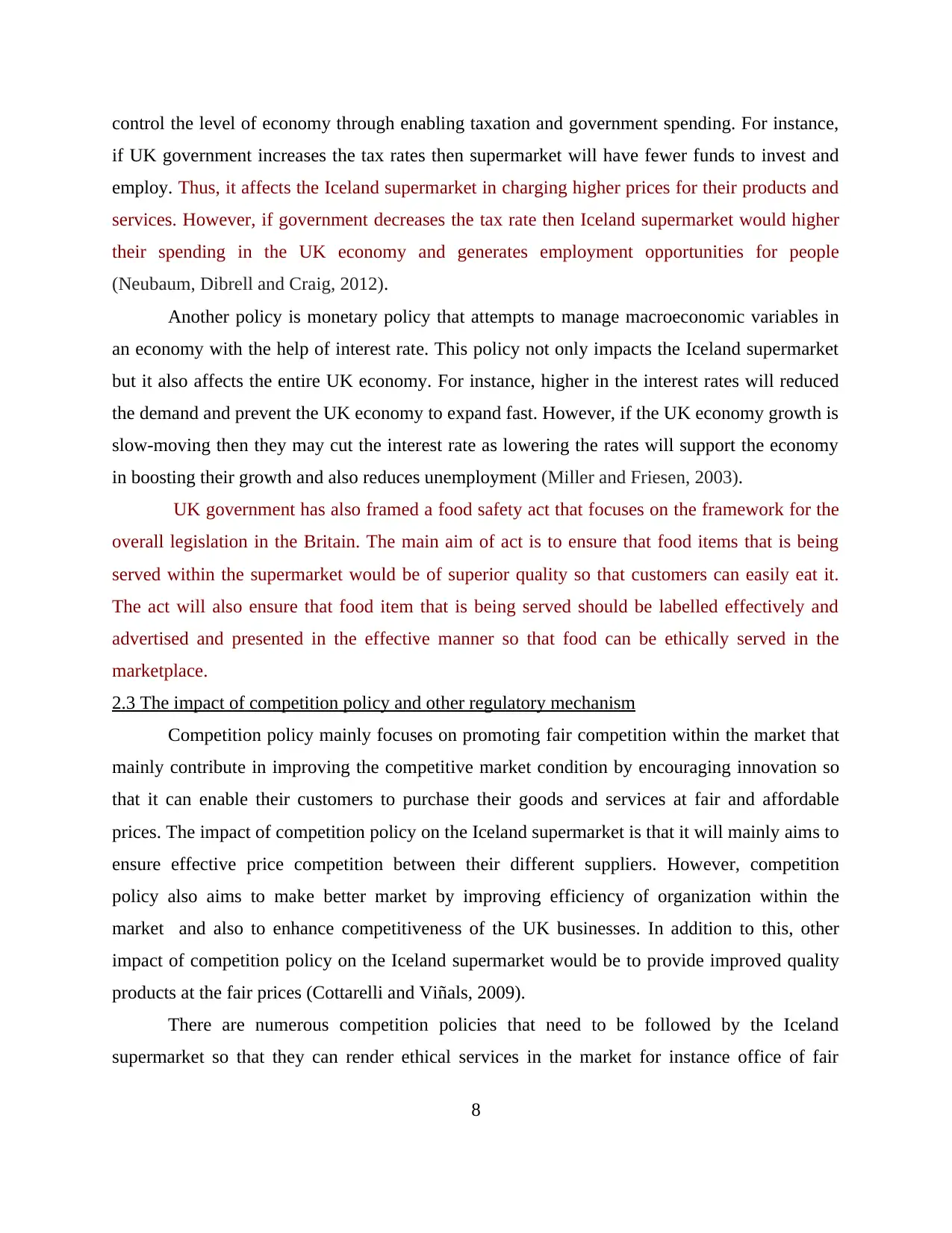
control the level of economy through enabling taxation and government spending. For instance,
if UK government increases the tax rates then supermarket will have fewer funds to invest and
employ. Thus, it affects the Iceland supermarket in charging higher prices for their products and
services. However, if government decreases the tax rate then Iceland supermarket would higher
their spending in the UK economy and generates employment opportunities for people
(Neubaum, Dibrell and Craig, 2012).
Another policy is monetary policy that attempts to manage macroeconomic variables in
an economy with the help of interest rate. This policy not only impacts the Iceland supermarket
but it also affects the entire UK economy. For instance, higher in the interest rates will reduced
the demand and prevent the UK economy to expand fast. However, if the UK economy growth is
slow-moving then they may cut the interest rate as lowering the rates will support the economy
in boosting their growth and also reduces unemployment (Miller and Friesen, 2003).
UK government has also framed a food safety act that focuses on the framework for the
overall legislation in the Britain. The main aim of act is to ensure that food items that is being
served within the supermarket would be of superior quality so that customers can easily eat it.
The act will also ensure that food item that is being served should be labelled effectively and
advertised and presented in the effective manner so that food can be ethically served in the
marketplace.
2.3 The impact of competition policy and other regulatory mechanism
Competition policy mainly focuses on promoting fair competition within the market that
mainly contribute in improving the competitive market condition by encouraging innovation so
that it can enable their customers to purchase their goods and services at fair and affordable
prices. The impact of competition policy on the Iceland supermarket is that it will mainly aims to
ensure effective price competition between their different suppliers. However, competition
policy also aims to make better market by improving efficiency of organization within the
market and also to enhance competitiveness of the UK businesses. In addition to this, other
impact of competition policy on the Iceland supermarket would be to provide improved quality
products at the fair prices (Cottarelli and Viñals, 2009).
There are numerous competition policies that need to be followed by the Iceland
supermarket so that they can render ethical services in the market for instance office of fair
8
if UK government increases the tax rates then supermarket will have fewer funds to invest and
employ. Thus, it affects the Iceland supermarket in charging higher prices for their products and
services. However, if government decreases the tax rate then Iceland supermarket would higher
their spending in the UK economy and generates employment opportunities for people
(Neubaum, Dibrell and Craig, 2012).
Another policy is monetary policy that attempts to manage macroeconomic variables in
an economy with the help of interest rate. This policy not only impacts the Iceland supermarket
but it also affects the entire UK economy. For instance, higher in the interest rates will reduced
the demand and prevent the UK economy to expand fast. However, if the UK economy growth is
slow-moving then they may cut the interest rate as lowering the rates will support the economy
in boosting their growth and also reduces unemployment (Miller and Friesen, 2003).
UK government has also framed a food safety act that focuses on the framework for the
overall legislation in the Britain. The main aim of act is to ensure that food items that is being
served within the supermarket would be of superior quality so that customers can easily eat it.
The act will also ensure that food item that is being served should be labelled effectively and
advertised and presented in the effective manner so that food can be ethically served in the
marketplace.
2.3 The impact of competition policy and other regulatory mechanism
Competition policy mainly focuses on promoting fair competition within the market that
mainly contribute in improving the competitive market condition by encouraging innovation so
that it can enable their customers to purchase their goods and services at fair and affordable
prices. The impact of competition policy on the Iceland supermarket is that it will mainly aims to
ensure effective price competition between their different suppliers. However, competition
policy also aims to make better market by improving efficiency of organization within the
market and also to enhance competitiveness of the UK businesses. In addition to this, other
impact of competition policy on the Iceland supermarket would be to provide improved quality
products at the fair prices (Cottarelli and Viñals, 2009).
There are numerous competition policies that need to be followed by the Iceland
supermarket so that they can render ethical services in the market for instance office of fair
8
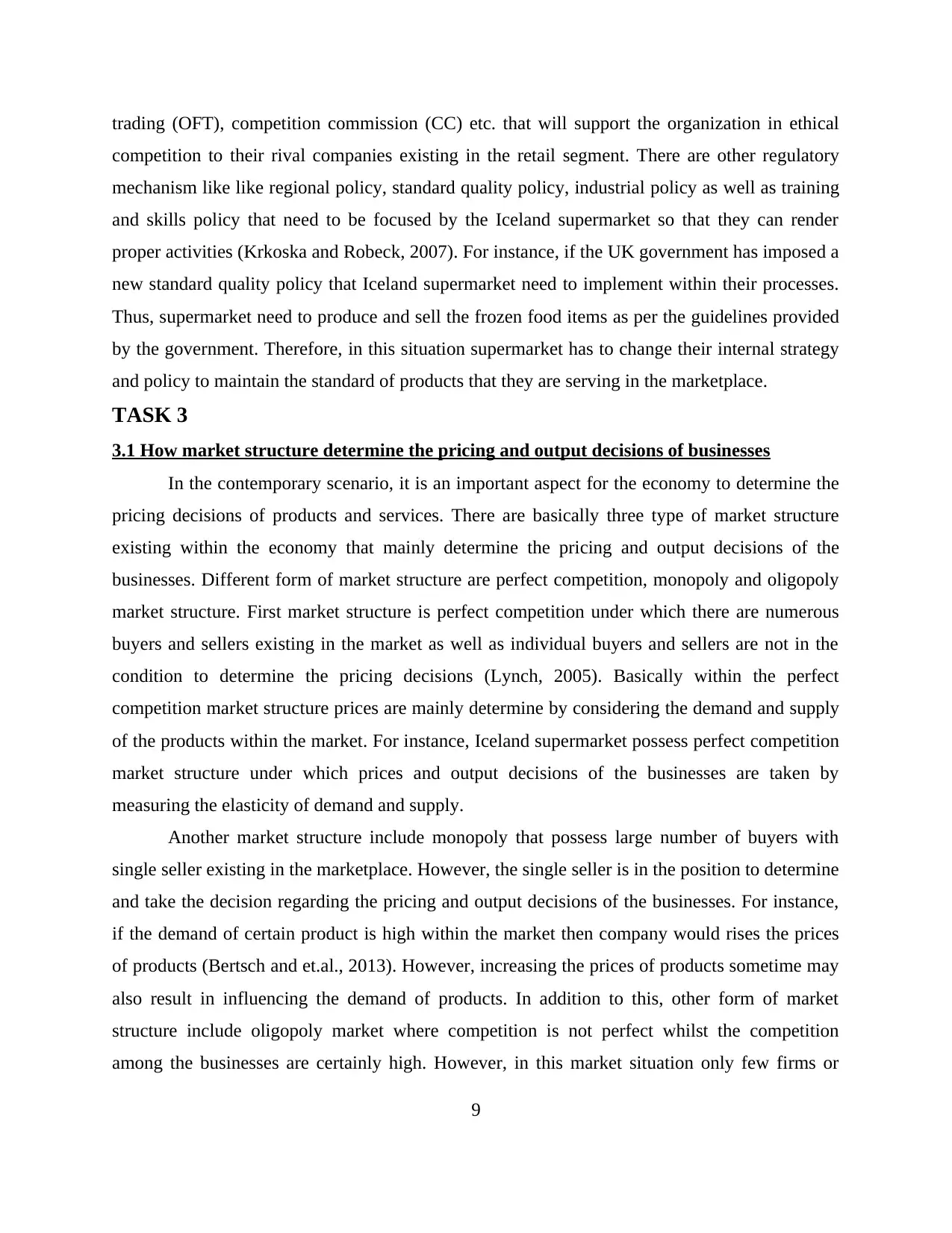
trading (OFT), competition commission (CC) etc. that will support the organization in ethical
competition to their rival companies existing in the retail segment. There are other regulatory
mechanism like like regional policy, standard quality policy, industrial policy as well as training
and skills policy that need to be focused by the Iceland supermarket so that they can render
proper activities (Krkoska and Robeck, 2007). For instance, if the UK government has imposed a
new standard quality policy that Iceland supermarket need to implement within their processes.
Thus, supermarket need to produce and sell the frozen food items as per the guidelines provided
by the government. Therefore, in this situation supermarket has to change their internal strategy
and policy to maintain the standard of products that they are serving in the marketplace.
TASK 3
3.1 How market structure determine the pricing and output decisions of businesses
In the contemporary scenario, it is an important aspect for the economy to determine the
pricing decisions of products and services. There are basically three type of market structure
existing within the economy that mainly determine the pricing and output decisions of the
businesses. Different form of market structure are perfect competition, monopoly and oligopoly
market structure. First market structure is perfect competition under which there are numerous
buyers and sellers existing in the market as well as individual buyers and sellers are not in the
condition to determine the pricing decisions (Lynch, 2005). Basically within the perfect
competition market structure prices are mainly determine by considering the demand and supply
of the products within the market. For instance, Iceland supermarket possess perfect competition
market structure under which prices and output decisions of the businesses are taken by
measuring the elasticity of demand and supply.
Another market structure include monopoly that possess large number of buyers with
single seller existing in the marketplace. However, the single seller is in the position to determine
and take the decision regarding the pricing and output decisions of the businesses. For instance,
if the demand of certain product is high within the market then company would rises the prices
of products (Bertsch and et.al., 2013). However, increasing the prices of products sometime may
also result in influencing the demand of products. In addition to this, other form of market
structure include oligopoly market where competition is not perfect whilst the competition
among the businesses are certainly high. However, in this market situation only few firms or
9
competition to their rival companies existing in the retail segment. There are other regulatory
mechanism like like regional policy, standard quality policy, industrial policy as well as training
and skills policy that need to be focused by the Iceland supermarket so that they can render
proper activities (Krkoska and Robeck, 2007). For instance, if the UK government has imposed a
new standard quality policy that Iceland supermarket need to implement within their processes.
Thus, supermarket need to produce and sell the frozen food items as per the guidelines provided
by the government. Therefore, in this situation supermarket has to change their internal strategy
and policy to maintain the standard of products that they are serving in the marketplace.
TASK 3
3.1 How market structure determine the pricing and output decisions of businesses
In the contemporary scenario, it is an important aspect for the economy to determine the
pricing decisions of products and services. There are basically three type of market structure
existing within the economy that mainly determine the pricing and output decisions of the
businesses. Different form of market structure are perfect competition, monopoly and oligopoly
market structure. First market structure is perfect competition under which there are numerous
buyers and sellers existing in the market as well as individual buyers and sellers are not in the
condition to determine the pricing decisions (Lynch, 2005). Basically within the perfect
competition market structure prices are mainly determine by considering the demand and supply
of the products within the market. For instance, Iceland supermarket possess perfect competition
market structure under which prices and output decisions of the businesses are taken by
measuring the elasticity of demand and supply.
Another market structure include monopoly that possess large number of buyers with
single seller existing in the marketplace. However, the single seller is in the position to determine
and take the decision regarding the pricing and output decisions of the businesses. For instance,
if the demand of certain product is high within the market then company would rises the prices
of products (Bertsch and et.al., 2013). However, increasing the prices of products sometime may
also result in influencing the demand of products. In addition to this, other form of market
structure include oligopoly market where competition is not perfect whilst the competition
among the businesses are certainly high. However, in this market situation only few firms or
9
⊘ This is a preview!⊘
Do you want full access?
Subscribe today to unlock all pages.

Trusted by 1+ million students worldwide
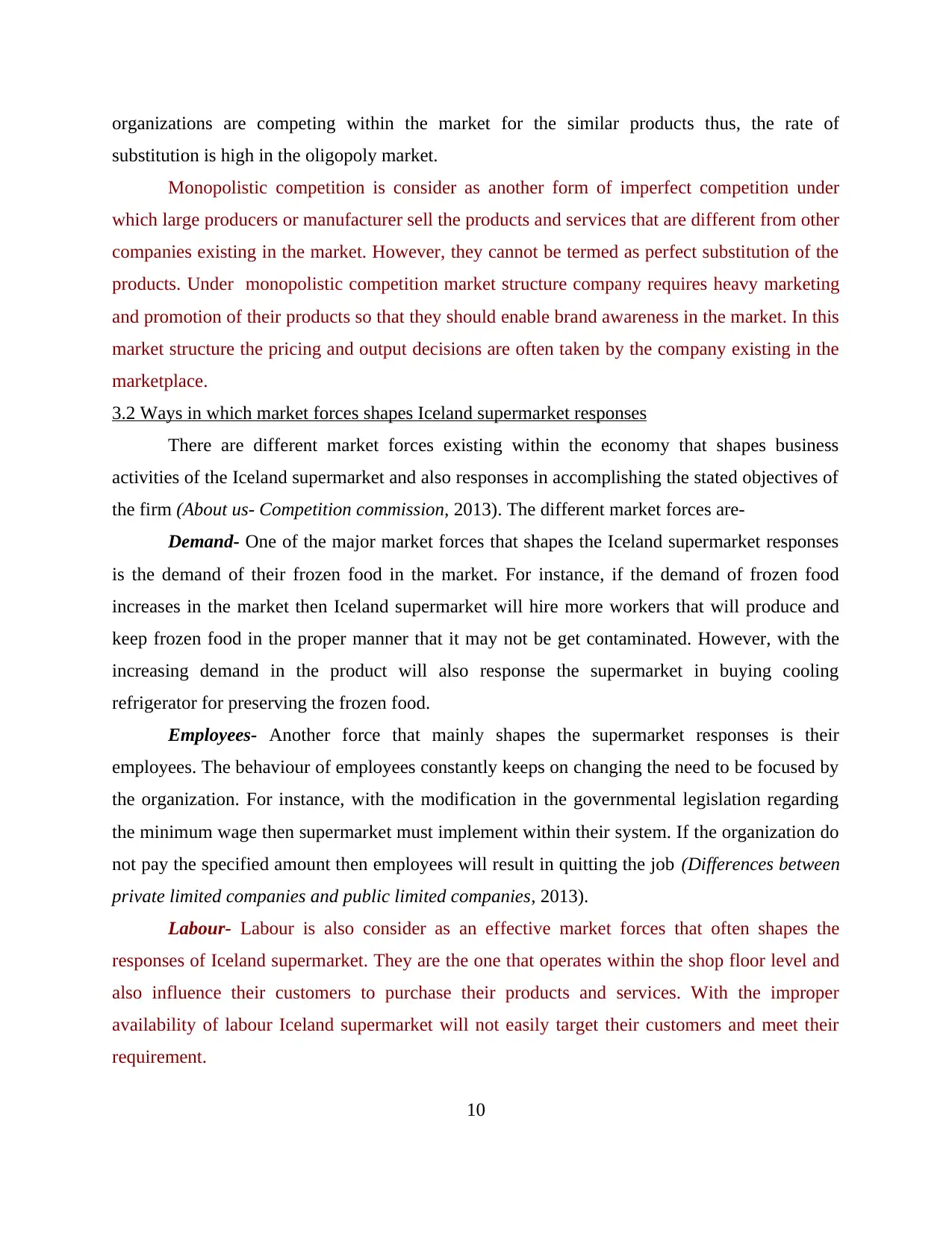
organizations are competing within the market for the similar products thus, the rate of
substitution is high in the oligopoly market.
Monopolistic competition is consider as another form of imperfect competition under
which large producers or manufacturer sell the products and services that are different from other
companies existing in the market. However, they cannot be termed as perfect substitution of the
products. Under monopolistic competition market structure company requires heavy marketing
and promotion of their products so that they should enable brand awareness in the market. In this
market structure the pricing and output decisions are often taken by the company existing in the
marketplace.
3.2 Ways in which market forces shapes Iceland supermarket responses
There are different market forces existing within the economy that shapes business
activities of the Iceland supermarket and also responses in accomplishing the stated objectives of
the firm (About us- Competition commission, 2013). The different market forces are-
Demand- One of the major market forces that shapes the Iceland supermarket responses
is the demand of their frozen food in the market. For instance, if the demand of frozen food
increases in the market then Iceland supermarket will hire more workers that will produce and
keep frozen food in the proper manner that it may not be get contaminated. However, with the
increasing demand in the product will also response the supermarket in buying cooling
refrigerator for preserving the frozen food.
Employees- Another force that mainly shapes the supermarket responses is their
employees. The behaviour of employees constantly keeps on changing the need to be focused by
the organization. For instance, with the modification in the governmental legislation regarding
the minimum wage then supermarket must implement within their system. If the organization do
not pay the specified amount then employees will result in quitting the job (Differences between
private limited companies and public limited companies, 2013).
Labour- Labour is also consider as an effective market forces that often shapes the
responses of Iceland supermarket. They are the one that operates within the shop floor level and
also influence their customers to purchase their products and services. With the improper
availability of labour Iceland supermarket will not easily target their customers and meet their
requirement.
10
substitution is high in the oligopoly market.
Monopolistic competition is consider as another form of imperfect competition under
which large producers or manufacturer sell the products and services that are different from other
companies existing in the market. However, they cannot be termed as perfect substitution of the
products. Under monopolistic competition market structure company requires heavy marketing
and promotion of their products so that they should enable brand awareness in the market. In this
market structure the pricing and output decisions are often taken by the company existing in the
marketplace.
3.2 Ways in which market forces shapes Iceland supermarket responses
There are different market forces existing within the economy that shapes business
activities of the Iceland supermarket and also responses in accomplishing the stated objectives of
the firm (About us- Competition commission, 2013). The different market forces are-
Demand- One of the major market forces that shapes the Iceland supermarket responses
is the demand of their frozen food in the market. For instance, if the demand of frozen food
increases in the market then Iceland supermarket will hire more workers that will produce and
keep frozen food in the proper manner that it may not be get contaminated. However, with the
increasing demand in the product will also response the supermarket in buying cooling
refrigerator for preserving the frozen food.
Employees- Another force that mainly shapes the supermarket responses is their
employees. The behaviour of employees constantly keeps on changing the need to be focused by
the organization. For instance, with the modification in the governmental legislation regarding
the minimum wage then supermarket must implement within their system. If the organization do
not pay the specified amount then employees will result in quitting the job (Differences between
private limited companies and public limited companies, 2013).
Labour- Labour is also consider as an effective market forces that often shapes the
responses of Iceland supermarket. They are the one that operates within the shop floor level and
also influence their customers to purchase their products and services. With the improper
availability of labour Iceland supermarket will not easily target their customers and meet their
requirement.
10
Paraphrase This Document
Need a fresh take? Get an instant paraphrase of this document with our AI Paraphraser
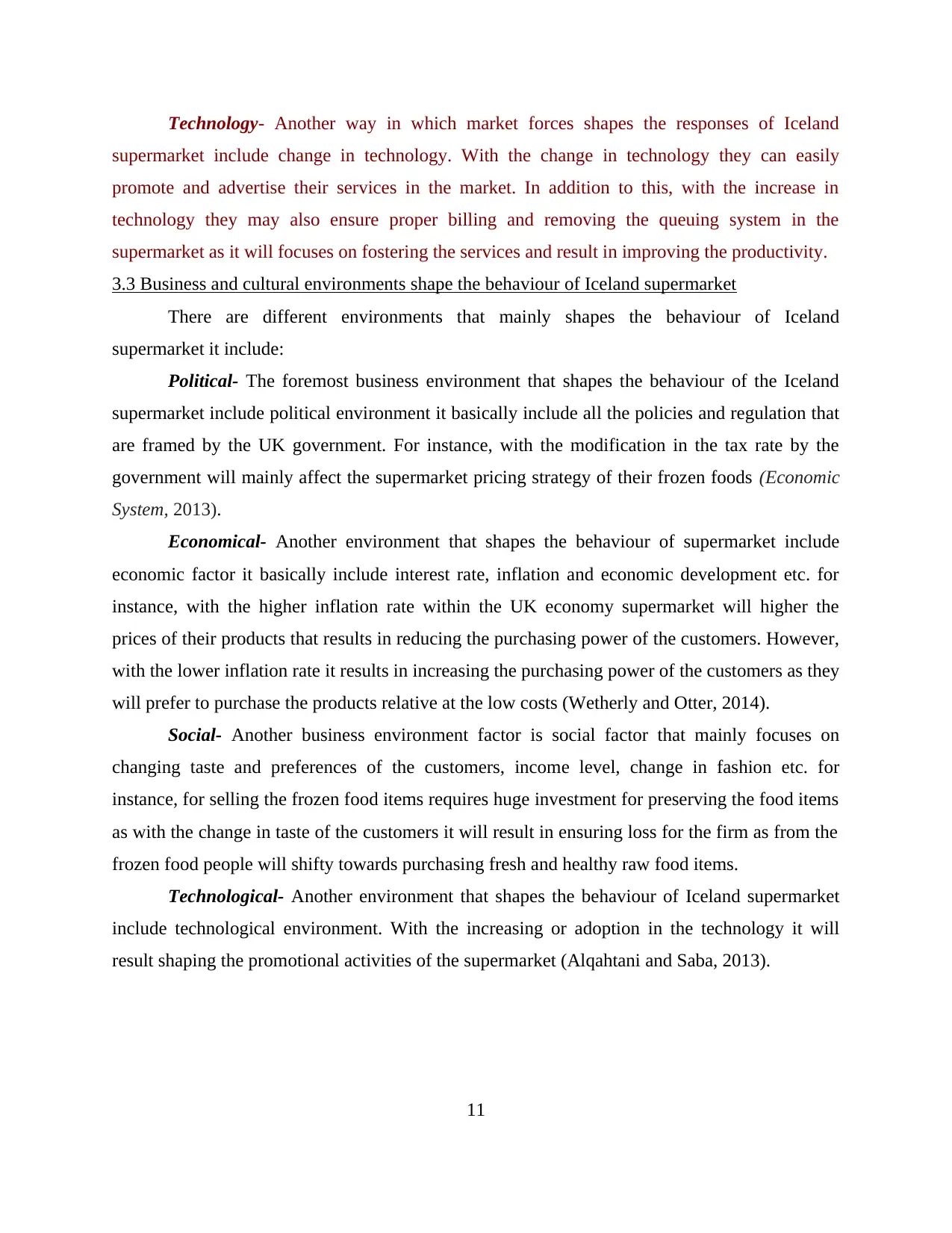
Technology- Another way in which market forces shapes the responses of Iceland
supermarket include change in technology. With the change in technology they can easily
promote and advertise their services in the market. In addition to this, with the increase in
technology they may also ensure proper billing and removing the queuing system in the
supermarket as it will focuses on fostering the services and result in improving the productivity.
3.3 Business and cultural environments shape the behaviour of Iceland supermarket
There are different environments that mainly shapes the behaviour of Iceland
supermarket it include:
Political- The foremost business environment that shapes the behaviour of the Iceland
supermarket include political environment it basically include all the policies and regulation that
are framed by the UK government. For instance, with the modification in the tax rate by the
government will mainly affect the supermarket pricing strategy of their frozen foods (Economic
System, 2013).
Economical- Another environment that shapes the behaviour of supermarket include
economic factor it basically include interest rate, inflation and economic development etc. for
instance, with the higher inflation rate within the UK economy supermarket will higher the
prices of their products that results in reducing the purchasing power of the customers. However,
with the lower inflation rate it results in increasing the purchasing power of the customers as they
will prefer to purchase the products relative at the low costs (Wetherly and Otter, 2014).
Social- Another business environment factor is social factor that mainly focuses on
changing taste and preferences of the customers, income level, change in fashion etc. for
instance, for selling the frozen food items requires huge investment for preserving the food items
as with the change in taste of the customers it will result in ensuring loss for the firm as from the
frozen food people will shifty towards purchasing fresh and healthy raw food items.
Technological- Another environment that shapes the behaviour of Iceland supermarket
include technological environment. With the increasing or adoption in the technology it will
result shaping the promotional activities of the supermarket (Alqahtani and Saba, 2013).
11
supermarket include change in technology. With the change in technology they can easily
promote and advertise their services in the market. In addition to this, with the increase in
technology they may also ensure proper billing and removing the queuing system in the
supermarket as it will focuses on fostering the services and result in improving the productivity.
3.3 Business and cultural environments shape the behaviour of Iceland supermarket
There are different environments that mainly shapes the behaviour of Iceland
supermarket it include:
Political- The foremost business environment that shapes the behaviour of the Iceland
supermarket include political environment it basically include all the policies and regulation that
are framed by the UK government. For instance, with the modification in the tax rate by the
government will mainly affect the supermarket pricing strategy of their frozen foods (Economic
System, 2013).
Economical- Another environment that shapes the behaviour of supermarket include
economic factor it basically include interest rate, inflation and economic development etc. for
instance, with the higher inflation rate within the UK economy supermarket will higher the
prices of their products that results in reducing the purchasing power of the customers. However,
with the lower inflation rate it results in increasing the purchasing power of the customers as they
will prefer to purchase the products relative at the low costs (Wetherly and Otter, 2014).
Social- Another business environment factor is social factor that mainly focuses on
changing taste and preferences of the customers, income level, change in fashion etc. for
instance, for selling the frozen food items requires huge investment for preserving the food items
as with the change in taste of the customers it will result in ensuring loss for the firm as from the
frozen food people will shifty towards purchasing fresh and healthy raw food items.
Technological- Another environment that shapes the behaviour of Iceland supermarket
include technological environment. With the increasing or adoption in the technology it will
result shaping the promotional activities of the supermarket (Alqahtani and Saba, 2013).
11
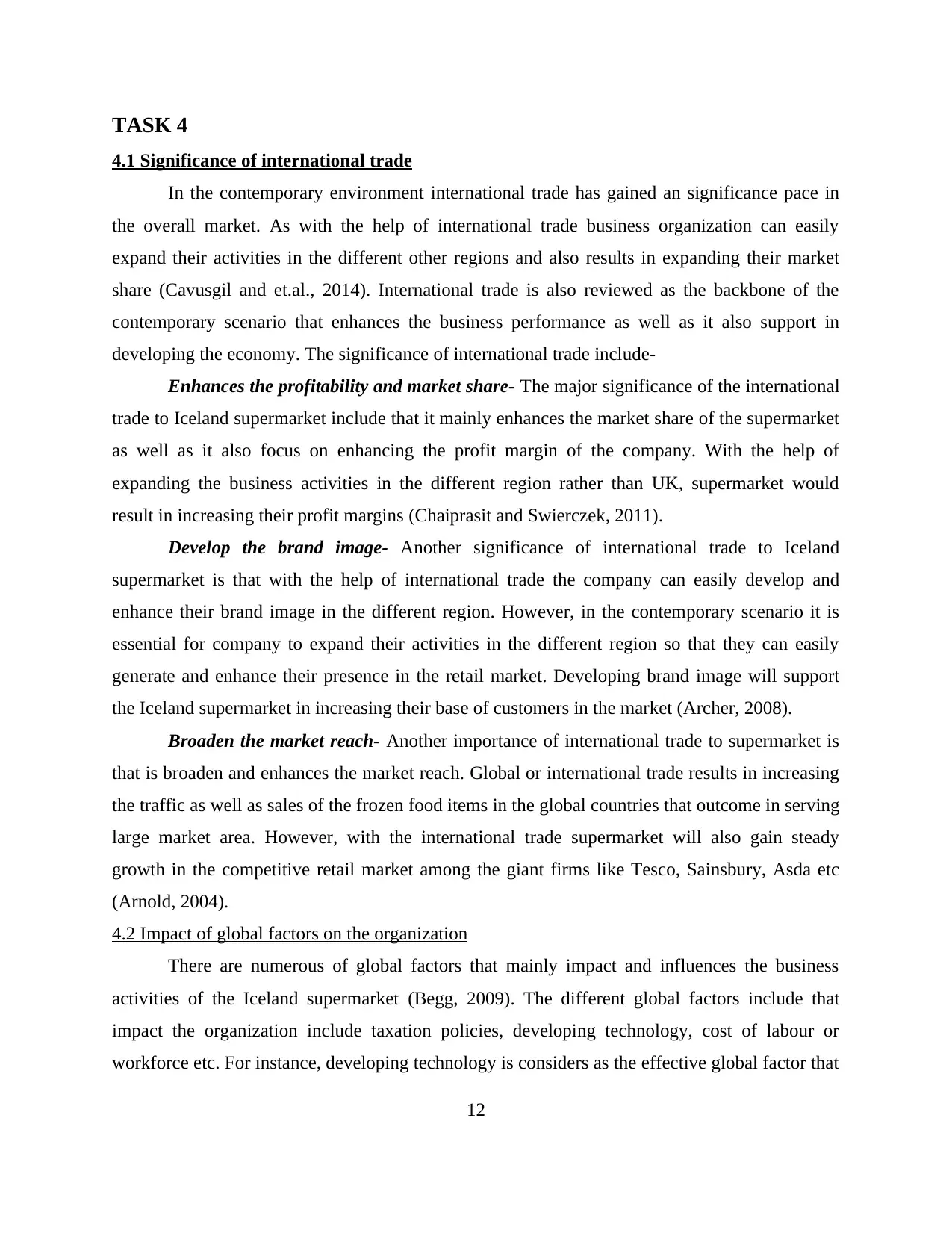
TASK 4
4.1 Significance of international trade
In the contemporary environment international trade has gained an significance pace in
the overall market. As with the help of international trade business organization can easily
expand their activities in the different other regions and also results in expanding their market
share (Cavusgil and et.al., 2014). International trade is also reviewed as the backbone of the
contemporary scenario that enhances the business performance as well as it also support in
developing the economy. The significance of international trade include-
Enhances the profitability and market share- The major significance of the international
trade to Iceland supermarket include that it mainly enhances the market share of the supermarket
as well as it also focus on enhancing the profit margin of the company. With the help of
expanding the business activities in the different region rather than UK, supermarket would
result in increasing their profit margins (Chaiprasit and Swierczek, 2011).
Develop the brand image- Another significance of international trade to Iceland
supermarket is that with the help of international trade the company can easily develop and
enhance their brand image in the different region. However, in the contemporary scenario it is
essential for company to expand their activities in the different region so that they can easily
generate and enhance their presence in the retail market. Developing brand image will support
the Iceland supermarket in increasing their base of customers in the market (Archer, 2008).
Broaden the market reach- Another importance of international trade to supermarket is
that is broaden and enhances the market reach. Global or international trade results in increasing
the traffic as well as sales of the frozen food items in the global countries that outcome in serving
large market area. However, with the international trade supermarket will also gain steady
growth in the competitive retail market among the giant firms like Tesco, Sainsbury, Asda etc
(Arnold, 2004).
4.2 Impact of global factors on the organization
There are numerous of global factors that mainly impact and influences the business
activities of the Iceland supermarket (Begg, 2009). The different global factors include that
impact the organization include taxation policies, developing technology, cost of labour or
workforce etc. For instance, developing technology is considers as the effective global factor that
12
4.1 Significance of international trade
In the contemporary environment international trade has gained an significance pace in
the overall market. As with the help of international trade business organization can easily
expand their activities in the different other regions and also results in expanding their market
share (Cavusgil and et.al., 2014). International trade is also reviewed as the backbone of the
contemporary scenario that enhances the business performance as well as it also support in
developing the economy. The significance of international trade include-
Enhances the profitability and market share- The major significance of the international
trade to Iceland supermarket include that it mainly enhances the market share of the supermarket
as well as it also focus on enhancing the profit margin of the company. With the help of
expanding the business activities in the different region rather than UK, supermarket would
result in increasing their profit margins (Chaiprasit and Swierczek, 2011).
Develop the brand image- Another significance of international trade to Iceland
supermarket is that with the help of international trade the company can easily develop and
enhance their brand image in the different region. However, in the contemporary scenario it is
essential for company to expand their activities in the different region so that they can easily
generate and enhance their presence in the retail market. Developing brand image will support
the Iceland supermarket in increasing their base of customers in the market (Archer, 2008).
Broaden the market reach- Another importance of international trade to supermarket is
that is broaden and enhances the market reach. Global or international trade results in increasing
the traffic as well as sales of the frozen food items in the global countries that outcome in serving
large market area. However, with the international trade supermarket will also gain steady
growth in the competitive retail market among the giant firms like Tesco, Sainsbury, Asda etc
(Arnold, 2004).
4.2 Impact of global factors on the organization
There are numerous of global factors that mainly impact and influences the business
activities of the Iceland supermarket (Begg, 2009). The different global factors include that
impact the organization include taxation policies, developing technology, cost of labour or
workforce etc. For instance, developing technology is considers as the effective global factor that
12
⊘ This is a preview!⊘
Do you want full access?
Subscribe today to unlock all pages.

Trusted by 1+ million students worldwide
1 out of 16
Related Documents
Your All-in-One AI-Powered Toolkit for Academic Success.
+13062052269
info@desklib.com
Available 24*7 on WhatsApp / Email
![[object Object]](/_next/static/media/star-bottom.7253800d.svg)
Unlock your academic potential
Copyright © 2020–2026 A2Z Services. All Rights Reserved. Developed and managed by ZUCOL.





